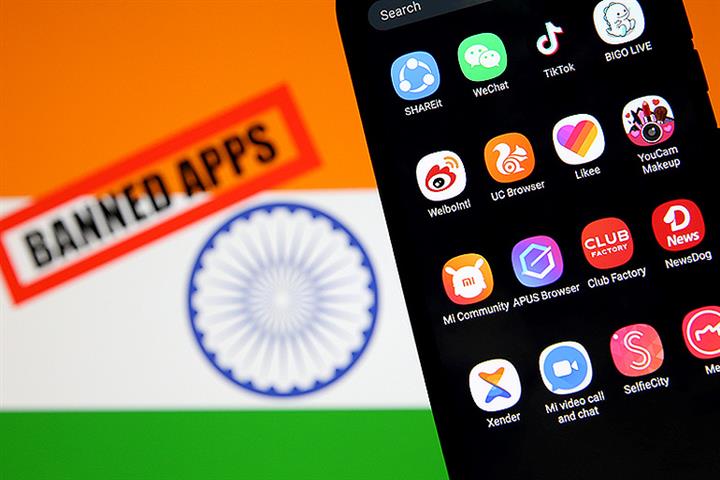 Chinese Firms, Investors Still Favor India After Mass Chinese App Ban
Chinese Firms, Investors Still Favor India After Mass Chinese App Ban(Yicai Global) Sept. 3 -- India will ban 118 Chinese mobile apps, including Alipay, Baidu and WeChat Reader, its government announced yesterday in a sweeping blacklist that snares 224 apps and which has prompted some Chinese companies to stop local services and cut staff to the bone and others to turn to European, American and Southeast Asian markets. Some investors and entrepreneurs remain rosy about India’s prospects, however.
The Indian headquarters of Club Factory, a cross-border e-commerce platform focused on the Indian market, will lay off staff, end contracts with customer service and warehousing, abort plans for two new offices, and shift the focus of its operations to neighboring countries with similar cultural back grounds in Southeast Asia, the Middle East, Africa and Europe.
Club Factory had hired more than 100 local employees for localized operations, had a customer service team of thousands and had set up four warehouses in Delhi and Bangalore with more than 400 workers before the news broke.
"The Indian market is like a trap covered in cake," an industry insider told Yicai Global. The country with its huge population second only to China’s seems to hold great potential, but short-term returns are very unlikely. Big companies must weather long cycles to position themselves in the South Asian nation, so “a short-term suspension or withdrawal is understandable," the insider added.
APUS, a tool app maker, fell under the ban. Founder Li Tao opted to pull its Chinese employees and remotely run its Indian business with a skeleton crew, while focusing on European, American, Japanese and Korean markets whose average revenue per user is much higher than India’s.
Bye-Bye Bharat
APUS’s loss in India is controlled at under 5 percent, as APUS has no revenue there. Though Indian users are 10 percent of the company’s total, its flexible local research and development and operation teams consist of just over 50 people, Li said.
Likee, the short video platform of JOYY, has also been hit in India. The company has trimmed its marketing budget in the domestic market, a company insider told Yicai Global.
Games, short videos and live broadcasts are the areas most affected at Yushi Fintech, which has done business in India for 12 years, its Vice President Liu Jiaoyue told Yicai Global. There are three types of "self-help" methods for everyone, he added. One is to work with local agents and do business in the guise of a local company. Another is to change products, enrich product lines or move to other regions to open up new markets. The last is to await opportunities.
Companies who survive this ban should sort out potential risks, maintain good relations with upstream and downstream, appease customers, and soundly review data privacy compliance in their products, said Wang Jie, director of offshore business at Zhejiang Kin Ding Law Firm.
The mobile internet, especially the consumer internet and online medical sector, will burgeon after the Covid-19 pandemic in India, noted Lin Meihan, the founder of India Renaissance Capital.
Second Inflection
Local wannabes of many pure tool apps began to emerge after the ban of the Chinese apps, Lin noted. Some Indian investors even openly urged domestic entrepreneurs to develop competing products on social media. Locals laid off by major Chinese companies are also popular in the Indian market, Lin added.
"Chinese entrepreneurs and Indian entrepreneurs complement each other. Indian entrepreneurs know more about the local market, while Chinese entrepreneurs know more about product operations and growth models," Lin noted. The pandemic and the sudden embargo have indeed brought certain challenges for India's venture capital market, but it should reach a better turning point in next year’s second half, Lin said.
Zhou Shuren, senior product director of Yushi Fintech, is optimistic about the development of financial technology in the Indian market. "As long as the market does not become saturated, there will still be opportunities if the general environment improves in the future," Zhou stated.
Editor: Ben Armour